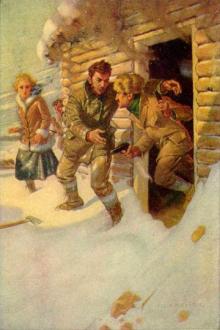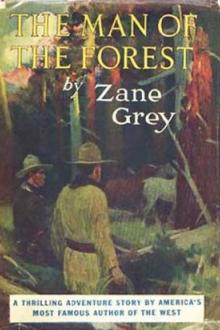Astoria; Or, Anecdotes of an Enterprise Beyond the Rocky Mountains by Irving (top romance novels .TXT) 📗

- Author: Irving
Book online «Astoria; Or, Anecdotes of an Enterprise Beyond the Rocky Mountains by Irving (top romance novels .TXT) 📗». Author Irving
On the 17th they met with several Indians, one of whom had a horse. Mr. Hunt was extremely desirous of obtaining it as a pack-horse; for the men, worn down by fatigue and hunger, found the loads of twenty pounds’ weight which they had to carry, daily growing heavier and more galling. The Indians, however, along this river, were never willing to part with their horses, having none to spare. The owner of the steed in question seemed proof against all temptation; article after article of great value in Indian eyes was offered and refused. The charms of an old tin-kettle, however, were irresistible, and a bargain was concluded.
A great part of the following morning was consumed in lightening the packages of the men and arranging the load for the horse. At this encampment there was no wood for fuel, even the wormwood on which they had frequently depended having disappeared. For the two last days they had made thirty miles to the northwest.
On the 19th of November, Mr. Hunt was lucky enough to purchase another horse for his own use, giving in exchange a tomahawk, a knife, a fire steel, and some beads and gartering. In an evil hour, however, he took the advice of the Indians to abandon the river, and follow a road or trail leading into the prairies. He soon had cause to regret the change. The road led across a dreary waste, without verdure; and where there was neither fountain, nor pool, nor running stream. The men now began to experience the torments of thirst, aggravated by their diet of dried fish. The thirst of the Canadian voyageurs became so insupportable as to drive them to the most revolting means of allaying it. For twenty-five miles did they toll on across this dismal desert, and laid themselves down at night, parched and disconsolate, beside their wormwood fires; looking forward to still greater sufferings on the following day. Fortunately it began to rain in the night, to their infinite relief; the water soon collected in puddles and afforded them delicious draughts.
Refreshed in this manner, they resumed their wayfaring as soon as the first streaks of dawn gave light enough for them to see their path. The rain continued all day, so that they no longer suffered from thirst, but hunger took its place, for after travelling thirty-three miles they had nothing to sup on but a little parched corn.
The next day brought them to the banks of a beautiful little stream, running to the west, and fringed with groves of cottonwood and willow. On its borders was an Indian camp, with a great many horses grazing around it. The inhabitants, too, appeared to be better clad than usual. The scene was altogether a cheering one to the poor half-famished wanderers. They hastened to their lodges, but on arriving at them met with a check that at first dampened their cheerfulness. An Indian immediately laid claim to the horse of Mr. Hunt, saying that it had been stolen from him. There was no disproving a fact supported by numerous bystanders, and which the horse stealing habits of the Indians rendered but too probable; so Mr. Hunt relinquished his steed to the claimant; not being able to retain him by a second purchase.
At this place they encamped for the night, and made a sumptuous repast upon fish and a couple of dogs, procured from their Indian neighbors. The next day they kept along the river, but came to a halt after ten miles’ march, on account of the rain. Here they again got a supply of fish and dogs from the natives; and two of the men were fortunate enough each to get a horse in exchange for a buffalo robe. One of these men was Pierre Dorion, the half-breed interpreter, to whose suffering family the horse was a timely acquisition. And here we cannot but notice the wonderful patience, perseverance, and hardihood of the Indian women, as exemplified in the conduct of the poor squaw of the interpreter. She was now far advanced in her pregnancy, and had two children to take care of; one four, and the other two years of age. The latter of course she had frequently to carry on her back, in addition to the burden usually imposed upon the squaw, yet she had borne all her hardships without a murmur, and throughout this weary and painful journey had kept pace with the best of the pedestrians. Indeed on various occasions in the course of this enterprise, she displayed a force of character that won the respect and applause of the white men.
Mr. Hunt endeavored to gather some information from these Indians concerning the country and the course of the rivers. His communications with them had to be by signs, and a few words which he had learnt, and of course were extremely vague. All that he could learn from them was that the great river, the Columbia, was still far distant, but he could ascertain nothing as to the route he ought to take to arrive at it. For the two following days they continued westward upwards of forty miles along the little stream, until they crossed it just before its junction with Snake River, which they found still running to the north. Before them was a wintry-looking mountain covered with snow on all sides.
In three days more they made about seventy miles; fording two small rivers, the waters of which were very cold. Provisions were extremely scarce; their chief sustenance was portable soup; a meagre diet for weary pedestrians.
On the 27th of November the river led them into the mountains through a rocky defile where there was scarcely room to pass. They were frequently obliged to unload the horses to get them by the narrow places; and sometimes to wade through the water in getting round rocks and butting cliffs. All their food this day was a beaver which they had caught the night before; by evening, the cravings of hunger were so sharp, and the prospect of any supply among the mountains so faint, that they had to kill one of the horses. “The men,” says Mr. Hunt in his journal, “find the meat very good, and, indeed, so should I, were it not for the attachment I have to the animal.”
Early the following day, after proceeding ten miles to the north, they came to two lodges of Shoshonies, who seemed in nearly as great extremity as themselves, having just killed two horses for food. They had no other provisions excepting the seed of a weed which they gather in great quantities, and pound fine. It resembles hemp-seed. Mr. Hunt purchased a bag of it, and also some small pieces of horse flesh, which he began to relish, pronouncing them “fat and tender.”
From these Indians he received information that several white men had gone down the river, some one side, and a good many on the other; these last he concluded to be Mr. Crooks and his party. He was thus released from much anxiety about their safety, especially as the Indians spoke about Mr. Crooks having one of his dogs yet, which showed that he and his men had not been reduced to extremity of hunger.
As Mr. Hunt feared that he might be several days in passing through this mountain defile, and run the risk of famine, he encamped in the neighborhood of the Indians, for the purpose of bartering with them for a horse. The evening was expended in ineffectual trials. He offered a gun, a buffalo robe, and various other articles. The poor fellows had, probably, like himself, the fear of starvation before their eyes. At length the women, learning the object of his pressing solicitations and tempting offers, set up such a terrible hue and cry that he was fairly howled and





Comments (0)